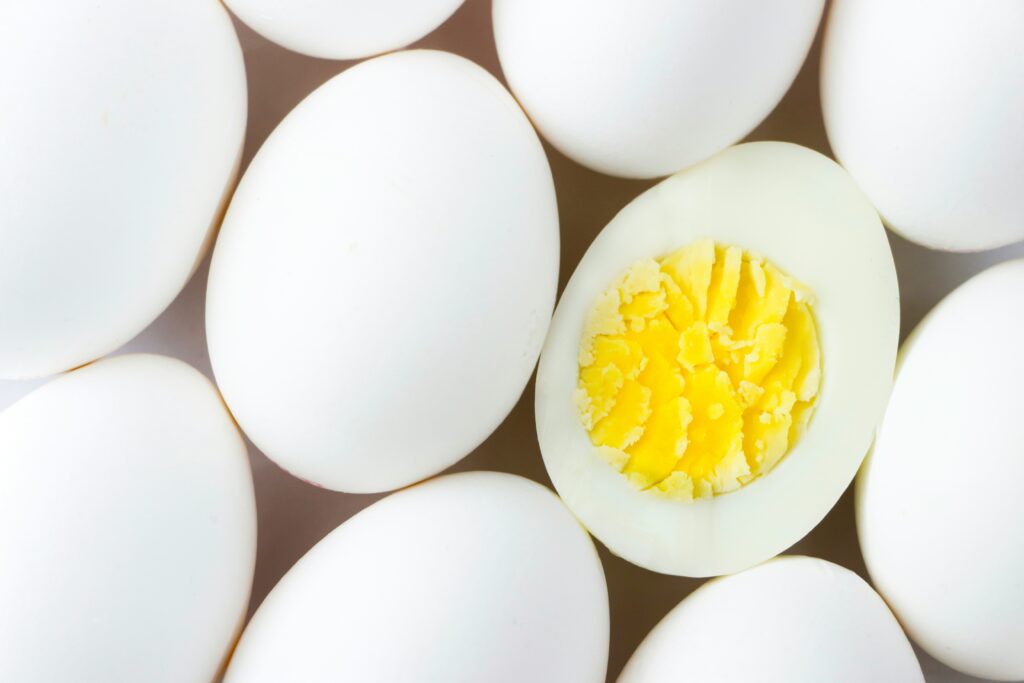Few kitchen tasks are as deceptively simple as boiling an egg. Yet, many of us have been frustrated by rubbery whites, runny yolks, or eggs that refuse to peel cleanly.
Whether you’re making a quick breakfast, a protein-packed snack, or prepping ingredients for a recipe, knowing how to boil eggs perfectly is a skill worth mastering.
The secret to success lies in understanding the science behind cooking eggs. By learning how heat transforms the proteins in an egg and adopting the right techniques, you can achieve perfectly boiled eggs every time.

The Science of Cooking Eggs
Eggs are a marvel of nature. To cook them perfectly, it helps to understand their structure and how heat interacts with their components:
- Egg Structure
- Shell: Made of calcium carbonate, the shell is porous and protects the egg.
- Egg White (Albumen): Contains water and proteins like ovalbumin, which coagulate when heated.
- Egg Yolk: Rich in fat and nutrients, the yolk thickens and solidifies at higher temperatures than the white.
- How Heat Affects Eggs
- When heated, proteins in the egg white and yolk denature and bond together, turning from liquid to solid.
- Overheating causes the proteins to tighten excessively, leading to rubbery whites and crumbly yolks.
- Temperature Matters
- Egg whites begin to set at 140°F (60°C) and fully cook at 180°F (82°C).
- Yolks thicken at 149°F (65°C) and firm up at 158°F (70°C).
Key Factors for Perfect Boiled Eggs
- Freshness of Eggs
- Fresh eggs are harder to peel due to the pH of the white, which binds tightly to the shell. Slightly older eggs (about 7-10 days old) are ideal for easy peeling.
- Water Temperature
- Starting with boiling water helps achieve consistent results.
- Cold water can lead to uneven cooking, especially for soft-boiled eggs.
- Cooking Time
- Soft-boiled: 6 minutes for runny yolks.
- Medium-boiled: 8 minutes for slightly jammy yolks.
- Hard-boiled: 10-12 minutes for fully set yolks.
Step-by-Step Guide to Boiling Eggs
Tools You’ll Need:
- A pot with a lid.
- A slotted spoon.
- A timer.
- A bowl of ice water.
Instructions:
- Prepare the Eggs
- Gently place eggs in a pot. Ensure they’re in a single layer for even cooking.
- Boil the Water
- Fill the pot with enough water to cover the eggs by an inch.
- Bring the water to a rolling boil.
- Cook the Eggs
- Lower the heat to maintain a gentle boil.
- Add the eggs using a slotted spoon to prevent cracking.
- Set a timer based on your desired doneness:
- 6 minutes for soft-boiled.
- 8 minutes for medium-boiled.
- 10-12 minutes for hard-boiled.
- Cool the Eggs
- Immediately transfer the eggs to a bowl of ice water to stop the cooking process.
- Let them cool for at least 5 minutes.
- Peel the Eggs
- Gently tap the shell on a hard surface and roll the egg to loosen the shell.
- Peel under running water for easier removal.
Troubleshooting Common Problems
- Green Ring Around the Yolk
- Caused by overcooking, which reacts sulfur in the white with iron in the yolk.
- Prevent by promptly cooling eggs in ice water.
- Difficulty Peeling
- Use older eggs and peel them under running water to make the process easier.
- Overcooked or Undercooked Eggs
- Always use a timer and adjust cooking times based on egg size and starting temperature.
Creative Uses for Boiled Eggs
Once you’ve mastered boiling eggs, the possibilities are endless:
- Salads
- Add sliced eggs to a Cobb salad or a simple green salad for extra protein.
- Sandwiches
- Make a classic egg salad sandwich or layer sliced eggs with avocado and tomato on toast.
- Snacks
- Sprinkle halved eggs with salt, pepper, and paprika for a quick snack.
- Global Flavors
- Use boiled eggs in ramen, curry dishes, or shakshuka for an international twist.
Mastering the art of boiling eggs is both practical and rewarding. By understanding the science behind cooking and following a few key techniques, you can achieve perfectly boiled eggs every time.
Whether you prefer soft, medium, or hard-boiled, the tips and methods shared here will ensure your eggs are cooked to perfection.









